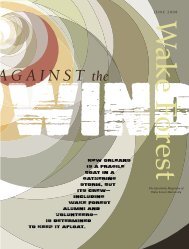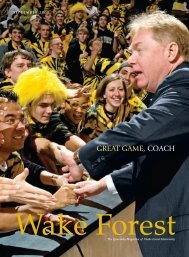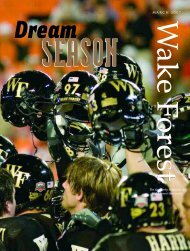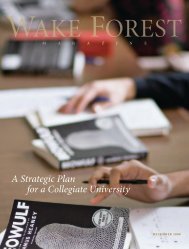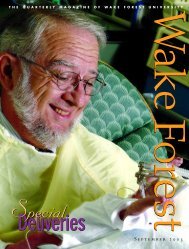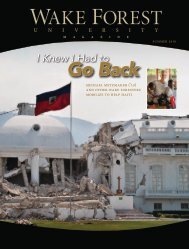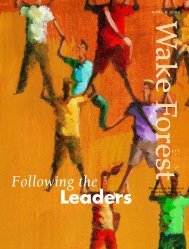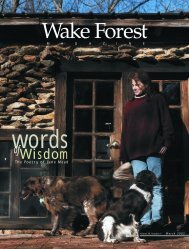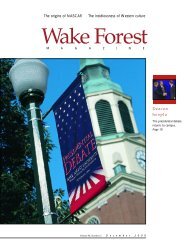Covers Contents - Past Issues - Wake Forest University
Covers Contents - Past Issues - Wake Forest University
Covers Contents - Past Issues - Wake Forest University
- No tags were found...
You also want an ePaper? Increase the reach of your titles
YUMPU automatically turns print PDFs into web optimized ePapers that Google loves.
Coliseum Drive, the Groves Stadiumsite, and Reynolda Gardens. NancySusan Reynolds made the library herown special cause, giving some two milliondollars to its endowment. Thesefigures from the fifties and sixties wouldhave a much higher dollar value today.A good portion of the Reynoldslargesse can be attributed to Tribble’spowers of persuasion. His productiverelationship with the family is renderedall the more remarkable by the factthat he was offending or angering somany other major constituents at thetime. After a hit by a Carolina tacklerinjured a star <strong>Wake</strong> <strong>Forest</strong> player in afootball game, Tribble publicly accusedthe Tar Heels of coaching their playersto play dirty. The ensuing uproar dissipatedmonths later, but Gordon Grayharbored ill feelings toward Tribblefor years. A series of conflicts and unpopulardecisions involving assortedcoaches and athletic administrators —James H. Weaver, the strong-willed butsuccessful athletics director who resistedTribble’s domination and finallyquit to become the first commissionerof the Atlantic Coast Conference;Weaver’s successor, Paddison W. Preston,who chafed under what he deemedto be arbitrary and capricious rule byTribble and ultimately resigned alongwith football coach Tom Rogers in late1955; baseball coach Taylor Sanford,who quit one year after guiding theDeacons to the national championshipbecause of the “disloyalty” reflected inthe president’s earlier attempt to firehim based on rumors about his personallife; basketball coach MurrayGreason (JD ’26), whom Tribble wantedto have fired for failing to teach hisplayers to shoot free throws accurately—fomented student demonstrationsand unfounded rumors that Tribbleplanned to deemphasize athletics andpull <strong>Wake</strong> <strong>Forest</strong> out of the ACC.All this, coupled with lingeringanger over the Peahead Walker episodeand the persistent belief of many inthe Baptist State Convention that theCollege was not sufficiently Christianin all of its practices, prompted outgoingboard chairman Basil Watkins(1915), a conservative, to appointa nine-member panel in November1955 to investigate the “overall situation”at <strong>Wake</strong> <strong>Forest</strong>. Behind Watkinswas Grover Jones, a fundamentalistpreacher who recently had beenelected president of the Baptist StateConvention. But after surveys hadbeen distributed to the faculty andstaff, the board suddenly squelchedthe inquiry in December, and thenannounced in February that nochange in the College administrationwould be made “at this time.” Clearly,a majority of the board was concernedabout the political and public relationsdamage that removing Tribble coulddo to the relocation at that criticaljunction. Afterward, a defiant Tribblewrote a letter to new board chairOdus Mull (1902, JD 1903) assertingno wrongdoing and castigating themotives of “Basil and his crowd” as a“plot to gain control of the College.”It is doubtful Tribble would haveovercome his trials or have raisedmoney as effectively as he did locallywithout the backing of trustee IrvingE. Carlyle (1917) of Winston-Salem.A founding partner of one of the state’slargest and most prominent law firmsand an early and energetic memberof the <strong>Wake</strong> <strong>Forest</strong> College Planningand Building Committee, Carlylehelped to offset the more reactionarymembers of the board with hisbusinesslike and relatively liberalapproach. To protect the move, heshielded, defused, and bridged morethan one bullet, land mine, andpitfall for the president.WFVER THE COURSE OF THE YEARObetween the springs of 1955 and1956, all but one of the twelve originalbuildings were certified as completedand turned over to College ownership.They were Wait Chapel, the Z. SmithTribble’s unpopular decisions involving sports and hisconflicts with athletics department officials—including, left toright, football coach Peahead Walker, athletics director JimWeaver, and basketball coach Murray Greason—underminedhis political position and almost cost him his job.SEPTEMBER 2006 25




